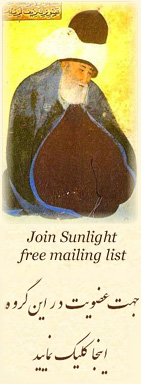Here, Sunlight offers a selection from the Mathnawi, volume V,
verses 672 to 682, in a version by Professor Coleman Barks, and in
the reference translation by Professor Reynold Nicholson, from which
Barks derived his version:
^ ^ ^ ^ ^
"A Just-Finishing Candle"
A candle is made to become entirely flame.
In that annihilating moment
it has no shadow.
It is nothing but a tongue of light
describing a refuge.
Look at this
just-finishing candle stub
as someone who is finally safe
from virtue and vice,
the pride and the shame
we claim from those.
-- Version by Coleman Barks
"The Essential Rumi"
HarperSanFrancisco, 1995
~ ~ ~ ~ ~ ~ ~ ~ ~ ~ ~ ~ ~ ~ ~ ~ ~ ~
When, through (spiritual) proverty, fana (self-naughting)
graces him (such a one), he becomes shadowless like Mohammed.
Fana graced (the Prophet who said) 'Poverty is my pride'*:
he became shadowless like the flame of a candle.
(When) the candle* has become entirely flame from head to
foot, the shadow hath no passage (way of approach) around it.
The wax (candle) fled from itself and from the shadow into
the radiance* for the sake of Him who moulded the candle.
He said, 'I moulded thee for the sake of fana (self-
naughting).' It replied, 'I accordingly took refuge in fana.'
This is the necessary everlasting radiance, not the radiance
of the perishable accidental candle.
When the candle is wholly naughted in the fire (of Divine
illumination), you will not see any trace of the candle or rays
(of its light).
Manifestly, in dispelling the darkness, the external
(material) flame is maintained by a wax candle;
(But) the candle (which is) the body is contrary to the wax
candle, since in proportion as that (the body) dwindles, the light
of the spirit is increased.
This is the everlasting radiance, and that (bodily candle) is
perishable: the candle of the spirit hath a Divine flame.
Since this tongue of fire was (really) light, 'twas far from
it to become a perishable shadow.
-- Translation and Commentary by Reynold A. Nicholson
"The Mathnawi of Jalalu'ddin Rumi
Published and Distributed by
The Trustees of The "E.J.W. Gibb Memorial"
* Or, Fana graced (him who attained to the state denoted by the
Prophet's saying) "Poverty is my pride."
* I.e. the lover of God.
* I.e. the Light of God.
The media:
http://tinyurl.com/rmgtf








No comments:
Post a Comment